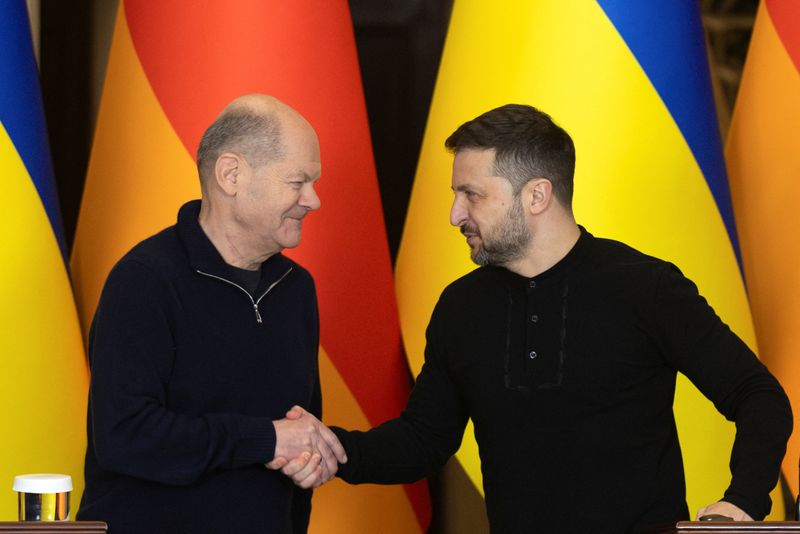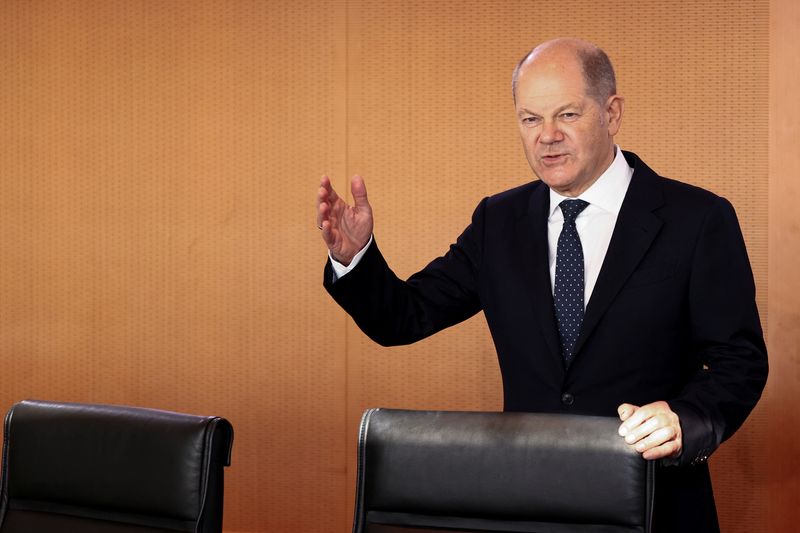By Pavel Polityuk and Tom Balmforth
KYIV (Reuters) -German Chancellor Olaf Scholz announced new military aid for Ukraine during a rare visit on Monday that he said sent a message to Russian President Vladimir Putin that Berlin would stand by Kyiv for as long as needed in the war.
The visit, his first to Kyiv since the early months of Russia's 2022 invasion, comes ahead of Donald Trump's return to the White House and weeks after Scholz's governing coalition in Berlin collapsed, threatening his future as chancellor.
The political upheaval in Germany, Europe's biggest economy, adds to a growing sense of uncertainty in Ukraine, with Russian troops advancing ever faster in the east. It is unclear how much Kyiv's European partners can step up support for Ukraine if Trump cuts help from the United States, its most powerful ally.
"My message from Kyiv to Putin: we're in this for the long haul. Our support for Ukraine will not waver. We will stand by the Ukrainian people - for as long as it takes," Scholz wrote on X.
Scholz used the trip to announce further equipment deliveries worth 650 million euros ($682.37 million) to arrive this month. The package includes IRIS-T air defence systems, Leopard 1 tanks and armed drones, a defence ministry spokesperson said.
Ukrainian President Volodymyr Zelenskiy, speaking in his nightly video address, said his talks with Scholz lasted more than 2-1/2 hours.
"We agreed at the meeting with the chancellor that Germany will be with Ukraine in the future exactly as it should be, regardless of what happens in global politics and whatever changes in mood there may be," he said.
Scholz and Zelenskiy reviewed drones manufactured by Ukrainian and German firms at an undisclosed location, visited a hospital and spoke to wounded service members and medical staff.
While trumpeting Germany as Ukraine's second-biggest weapons supplier after the United States, Scholz has repeatedly refused to send Taurus cruise missiles to Ukraine, fearing this could draw his country into a direct conflict with Russia.
Zelenskiy told a joint news conference that Ukraine needed more air defences to protect two dozen "special" sites. "We are working to have more common ground on the Taurus issue," he said.
Scholz has also drawn fire from allies, including Zelenskiy himself, for holding a phone call with Russian President Vladimir Putin in November for the first time in almost two years, which critics saw as a bid for domestic political gain.
He defended his call with Putin at Monday's news conference, saying he used the conversation to tell the Russian leader to end his invasion and pull back his troops, and that Ukraine had a right to be an independent sovereign nation.
Zelenskiy's government is urging NATO to invite Ukraine during a meeting in Brussels this week to join the U.S.-led military alliance, though some allies remain strongly opposed.
GERMAN ELECTION ISSUE
Ukraine is shaping up as a major issue in campaigning for Germany's snap election in February.
Friedrich Merz, the conservative opposition leader who is on course to unseat Scholz, has said Germany should send Taurus missiles.
Roderich Kiesewetter from the conservative Christian Democrats (CDU) accused Scholz of "campaigning on the backs of the Ukrainian population and at the same time ... feeding the Russian fear narrative".
"He is increasingly isolating Germany and endangering our security," he told the Augsburger Allgemeine newspaper.
Moscow's troops have been capturing village after village in Ukraine's east, pushing to fully seize the industrial Donbas region, while Russian airstrikes continue to target a hobbled Ukrainian energy grid as winter sets in.
In November, the outgoing Biden administration granted Ukraine permission to use Western missiles to strike further into Russian territory. Moscow responded by attacking Ukraine with a new intermediate-range ballistic missile, and has threatened strikes on government sites in Kyiv.
Ukraine has long demanded Moscow withdraw all troops from its territory. It also wants Western security guarantees comparable to NATO membership to prevent Russia attacking again.
Moscow, which controls nearly a fifth of Ukrainian territory, demands recognition of its annexation of Ukrainian land and permanent neutrality for Ukraine.
Last week Zelenskiy floated the idea of Ukraine being granted NATO membership even while Russia occupies some captured territory, which he said could end the "hot stage" of the war.

On Sunday, he clarified that any invitation to join NATO must extend to all Ukrainian territory, even if the alliance's collective defence agreement might not operate in areas occupied by Russian forces.
($1 = 0.9526 euro)
